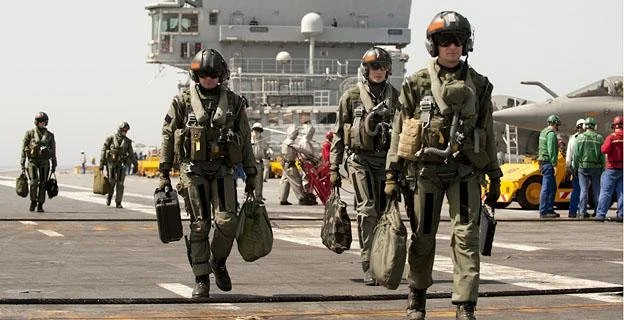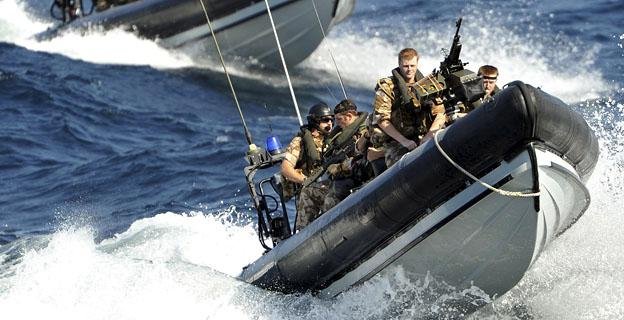Atlantica Magazine
Young professionals are often an unheard voice in policy discussions. More often than not, however, it is their insights that we need to break hardwired, outdated ideas about foreign policy and transatlanticism. Atlantica aims to amplify the voices of the young generation of transatlanticists. Our team is committed to publishing your article. Each issue features three articles per month on a theme selected by the Atlantic Forum team, in conjunction with NATO’s Public Diplomacy Division.
Find our latest
Atlantica publications here:

Projecting stability in Afghanistan: Mission accomplished?
The dilemma of whether or not to withdraw NATO and US missions in Afghanistan has finally been solved: America's longest war will end in September.

The State of Libya and what NATO should do about it
The word ‘state’ means a condition of being, as in ‘a state of shock.’ Yet, the word ‘state’ is also used to describe a body politic. This second usage derives from the first and dates to the Middle Ages. It is easy to see how this definition evolved. Consider that American presidents’ annual address to Congress is called the ‘state of the union’.
This etymology illustrates the approach to be taken in thinking about foreign policy. The state of affairs in a country defines the country, the state, so much so that we use the same word. Therefore, when embarking on a course of action, rather than applying a general view—interventionism versus non-interventionism, or the purpose, mandate, or effectiveness of an instrument, in our case NATO—one must first take stock of the conditions there. This paper first takes account of the state of Libya. It then considers what NATO should do about the situation there and how it should go about doing it.

Countering terrorism via the security-development nexus: Lessons learned from the US provincial reconstruction teams in Afghanistan
The Security-Development Nexus (SDX) is a crucial concept within the disciplines of post-conflict reconstruction and conflict resolution. The term SDX was coined during the post-Cold War era when the international system experienced a growing number of civil wars. Although international society eventually managed to solve many of the conflicts, the biggest challenges came later, when peacemakers attempted to reconstruct war-torn societies in order to prevent future conflicts as well as deliver social and economic prosperity.

Recognizing the sixth front: The cognitive domain and disinformation during the COVID-19 pandemic
Recognizing the cognitive domain would further expand NATO’s capabilities into a non-kinetic area.

NATO's response to the COVID-19 infodemic: The role of CIB simulations
This article will focus on NATO’s ability to counter COVID-19 disinformation, focusing on the approach Quirks takes. Quirks, a department of the Dutch counter-disinformation platform DROG, specialises in war-gaming and Coordinated Inauthentic Behaviour (CIB) simulations. DROG is most well-known for the viral game Bad News, which has been proven to increase the ability of players to recognise disinformation as shown in research by the University of Cambridge. Bad News engenders the basic tenet of all DROG’s projects and products: our preventative approach, or prebunking.
When it comes to addressing disinformation, there has always been a large focus on content and narratives. However, this approach leaves those involved several steps behind. Instead, DROG aims to focus on the techniques and tactics that are used in the creation of disinformation. This increases our ability to undertake preemptive steps to address these factors, which will ultimately lead to the safeguarding of democratic societies as a whole. In November 2020 DROG conducted a webinar series on the COVID-19 infodemic, in the fictive world of Botteborg for the Dutch general public. This article dives into the role that CIB simulations and interactive webinars as such can play in combating the COVID-19 infodemic and how these in turn can be used and provided by NATO to ultimately: Replay, research, resolve and rebuild.

Empowering itself and countering its rivals: A dual crisis management strategy for NATO
The COVID-19 virus, which is believed to have originated from a wholesale seafood market in Wuhan, China, rapidly spread throughout the rest of the globe, affecting hundreds of countries in an unprecedented manner. While the novel coronavirus was initially identified in December 2019, the World Health Organization (WHO) declared the pandemic only in March 2020.[i] Belated declaration of a pandemic by the WHO, which came under heavy criticism,[ii] also demonstrated how critical it is to have effectively functioning international organizations to address international problems.

Operation Unified Protector: The first (and last) of its kind
In many ways, NATO’s Operation Unified Protector in Libya was one of a kind. It was the first time that the US “led from behind”, and the first time after the end of the Cold War that there was no post-conflict engagement on the ground in the aftermath of a NATO air campaign.
But, it also showed some shortcomings of NATO: first, it was marked by political disarray among European allies. Second, a lack of up-to-date intelligence on the cultural and social terrain emerged, with dire consequences for the legitimacy of the intervention. Third, this article will argue that the rapid disengagement after the aerial campaign was the result of a lack of planning for “the day after” and the main cause of the chronicization of the conflict.
Now, ten years later, not only can the successes and shortcomings of Operation Unified Protector be assessed objectively, but it is also possible to investigate the operation’s significance for NATO adaptability. This article will examine some lessons learned for NATO.
In the first place, the disarray among Allies (and the use of the North Atlantic Council as a 'second-rank' forum to inform all Allies of decisions taken by a small group) is being addressed by Secretary General Stoltenberg’s insistence on NATO becoming a “more political” alliance. This is an invitation to Allies to treat the North Atlantic Council as a privileged forum to discuss political issues, and to find common ground between their respective security priorities and positions.
In the second place, the Comprehensive Approach has formalized useful practices for post-conflict engagement, such as Knowledge Development and Civil-Military Cooperation: thus respectively addressing the lack of intelligence and the necessity of establishing closer ties with actors on the ground to avert instability.

Operation Unified Protector: Strategic lessons learnt
23 March 2021 will mark 10 years since the beginning of Operation Unified Protector (OUP), a NATO-led operation including France, the UK, and the US against the Libyan Armed Forces led by Muammar Gaddafi that was carried out to protect Libyan civilians and civilian-populated areas. United Nations Security Council resolutions 1970 and 1973 concerning the Libyan Civil War were implemented on 26 February and 17 March 2011, respectively. The operation ended with the establishment of a no-fly zone over Libya and imposing sanctions on the Gaddafi regime. While the operation contributed to the Gaddafi regime’s eventual downfall, it should be mentioned that this was an unintended consequence, which should have been expected following the initial uprising.
This article will examine the main strategic lessons that NATO personnel have learnt throughout this operation including improving coordination between air and naval forces; structural problems within Allied Joint Force Command Naples; lack of cultural advisers for the region; clear political-military gap in the operation; the need to improve strategic communication; and the lack of strategic vision in the region.
The above-mentioned strategic lessons, along with recommendations, will be discussed in this article.

Operation Unified Protector: Lessons learned for NATO
Determined to maintain NATO’s relevance in the aftermath of the Cold War, Allies began reconsidering the role of the organization as reflected in the series of new strategic concepts adopted in 1991 and 1999, which established an important turning point in the Alliance’s approach to security.

NATO after Trump: Main challenges for the Biden administration
As Joe Biden takes office as the 46th President of the United States, he will face many challenges in mending transatlantic relations. Former US President Donald Trump has left a great divide within the transatlantic Alliance. His threats to pull the US out of NATO if allied states failed to raise their military expenditures, as well as his generally aggressive rhetoric, aimed to decrease the value of the Alliance. Even though Trump had made some valid points concerning some persistent problems within the Alliance before he took office, such as the fact that the European allies had become too reliant on the US military, the statements he made on this issue were quite controversial and, as many European leaders saw, not fair. Therefore, the mistrust between the two sides of the Atlantic came to be an even more pressing issue. Now, as a new president is set to take office, it is important to analyze notions in Biden’s narratives that indicate that the US will try to mend the relationships between the two sides in order to rejoin forces and become even stronger.